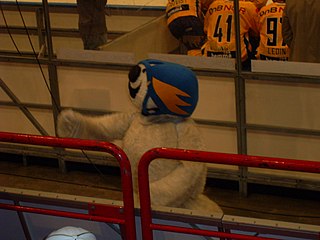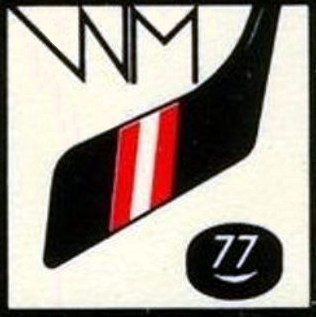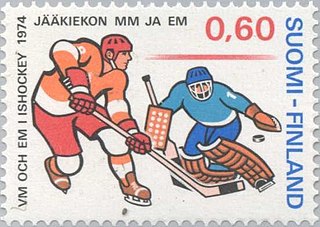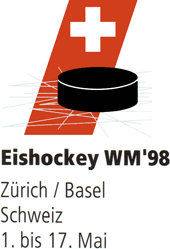
Vladislav Aleksandrovich Tretiak, MSM is a Russian former goaltender for the Soviet Union national ice hockey team. He was inducted into the inaugural class of the International Ice Hockey Federation (IIHF) Hall of Fame in 1997. Considered to be one of the greatest goaltenders in the history of the sport, he was voted one of six players to the IIHF Centennial All-Star Team in a poll conducted by a group of 56 experts from 16 countries. He is the current president of the Ice Hockey Federation of Russia and was the general manager of the Russian 2010 Winter Olympic team.

The Soviet national ice hockey team was the national men's ice hockey team of the Soviet Union. From 1954, the team won at least one medal each year at either the Ice Hockey World Championships or the Olympic hockey tournament.

The 1995 Men's Ice Hockey World Championships was the 59th such event sanctioned by the International Ice Hockey Federation (IIHF). Teams representing 39 countries participated in several levels of competition. The competition also served as qualifications for group placements in the 1996 competition.

The 1997 Men's Ice Hockey World Championships was the 61st such event sanctioned by the International Ice Hockey Federation (IIHF). Teams representing 36 countries participated in several levels of competition, while three other teams competed in an exhibition tournament to gain experience before joining on an official basis in the 1998 competition. The competition also served as qualifications for group placements in the 1998 competition.
The 1992 Men's Ice Hockey World Championships was the 56th such event sanctioned by the International Ice Hockey Federation (IIHF). Teams representing a record 32 countries participated in several levels of competition. The competition also served as qualifications for group placements in the 1993 competition.

The 1991 Men's Ice Hockey World Championships was the 55th such event sanctioned by the International Ice Hockey Federation (IIHF), and at the same time served as the 66th and last Ice Hockey European Championships. Teams representing 25 countries participated in several levels of competition. The competition also served as qualifications for group placements in the 1992 competition.
The 1989 Ice Hockey World Championships took place in Sweden from 15 April – 1 May. The games were played in Södertälje and Stockholm, in the newly built arena Globen. Eight teams took part, and each team played each other once. The four best teams then played each other again. This was the 53rd World Championships, and also the 64th European Championships. The Soviet Union became world champions for the 21st time, and also European champions for the 26th time.

The 1986 Ice Hockey World Championships took place in the Soviet Union from 12 to 28 April. The games were played at the Luzhniki Palace of Sports and the CSKA Ice Palace in Moscow, and eight teams took part. Each team played each other once, and then The four best teams then played each other once more with no results carrying over, and the other four teams played each other again to determine ranking and relegation. This was the 51st World Championships, and also the 62nd ice hockey European Championships. The reigning world champions from Czechoslovakia finished fifth, and the Soviet Union became World Champions for the twentieth time, and also won their 24th European Championship. In the European Championship, only mutual games between European teams in the first round were counted. For the disappointing Czechoslovaks, this was the first time since 1967 that they had finished out of the medals, and their worst result outside the Olympics since 1937.

The 1983 Ice Hockey World Championships took place in West Germany from 16 April to 2 May. The games were played in Munich, Dortmund and Düsseldorf. Eight teams took part, with each playing each other once. The four best teams then play each other once more with no results carrying over this time, and the other four teams played each other again to determine ranking and relegation. This was the 49th World Championships, and also the 60th European Championships. The Soviet Union became world champions for the 19th time, tying Canada, and won their 22nd European title.
The 1981 Ice Hockey World Championships took place in Sweden between 12 and 26 April 1981, with games being played in the arenas of Scandinavium in Gothenburg and Johanneshovs isstadion in Stockholm. Eight teams took part, first splitting into two groups of four, with the best two from each group advancing to the final group. These teams then play each other in the final round. This was the 47th World Championships, and also the 58th European Championships. The Soviet Union became World Champions for the 17th time, and also won their twentieth European title. Don Cherry commented, "This is the best Russian team I've ever seen."
The 1978 Ice Hockey World Championships took place in Prague, Czechoslovakia from 26 April to 14 May. Eight teams took part, with each team playing each other once in the first round, and then the four best teams meeting in a new round. This was the 45th World Championships, and also the 56th European Championships. The USSR won for the fifteenth time, narrowly defeating the incumbent Czechoslovaks.

The 1977 Ice Hockey World Championships took place in Vienna, Austria from 21 April to 8 May. Eight teams took part, first playing each other once, then the four best teams advancing to a new round. The tournament was also the 55th ice hockey European Championship. Czechoslovakia won for the fifth time, and second in a row, claiming their 14th and final European title as well.
The 1976 Ice Hockey World Championships were the 43rd Ice Hockey World Championships and the 54th European Championships in ice hockey. The tournament took place in Poland from 8 to 25 April, and the games were played in Katowice. Eight teams took part in the main tournament, with each team first playing each other once. The four best teams then took part in a medal play off, and the teams placed 5–8 took part in a relegation play-off. The teams took the results from the first round through to the second round with them.
The 1975 Ice Hockey World Championships were the 42nd Ice Hockey World Championships and the 53rd European Championships of ice hockey. The tournament took place in West Germany from 3 to 19 April and the games were played in Munich and Düsseldorf. Six teams took part in the main tournament, each playing each other twice. The Soviet Union won all of their games, and became World Champions for the fourteenth time, and won their 17th European title.

The 1974 Ice Hockey World Championships were the 41st Ice Hockey World Championships and the 52nd European Championships in ice hockey. The tournament took place in Finland from 5 to 20 April and the games were played in the capital, Helsinki. Six teams took part in the main tournament, all playing each other twice. The Soviet Union won the world championships for the 13th time, and also won their 16th European title.

The 1973 Ice Hockey World Championships were the 40th Ice Hockey World Championships and the 51st European Championships of ice hockey. The tournament took place in the Soviet Union from 31 March to 15 April and the games were played at the Palace of Sports of the Central Lenin Stadium in Moscow.
The 1997 World Junior Ice Hockey Championships were held in Geneva and Morges, Switzerland. The tournament was won by Canada, who won their record fifth-straight gold medal with a 2–0 victory over the United States in the gold-medal match. Mike York of the United States was the top scorer in the tournament, with five goals and five assists for ten points.
The 1972 Ice Hockey World Championships was the 39th edition of the Ice Hockey World Championships. The tournament was held in Prague, Czechoslovakia from 7 to 22 April 1972, and the Czechoslovakia national team won the tournament, the third time they had done so and first since 1949, ending the Soviet Union's streak of nine consecutive titles. In addition it was the Czechoslovaks' 12th European title.

The 2000 IIHF World Championship was held in Saint Petersburg, Russia from 29 April to 14 May.

The 1998 IIHF World Championship was held in Switzerland from 1–17 May 1998. The format expanded to 16 teams for the first time. The teams were divided into four groups of four with the top two teams in each advancing to the next round. The two groups of four then played a round robin with the top two teams in each moving on to the semi-finals. The semi-finals were a two-game total goals for series as was the final.












